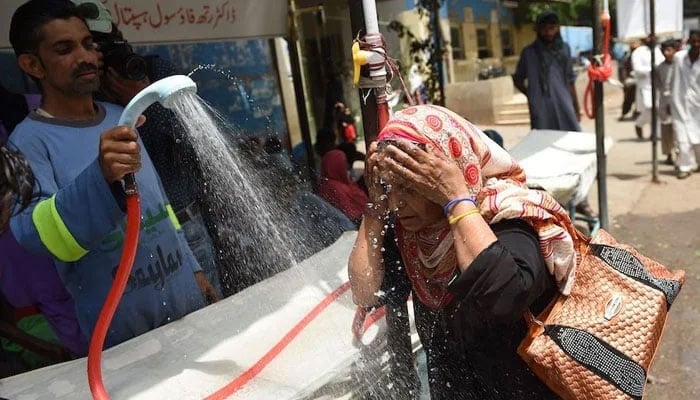Hottest October in 57 years: Is Karachi losing its winter?
The October weather data from the Pakistan Meteorological Department (PMD) has raised serious questions about the future of Karachi’s climate, hinting at a possible shift toward a year-round “hot” or “very hot” climate.
With Karachi experiencing the warmest nights on record for October, environmentalists and meteorologists alike are increasingly concerned about the city’s climatic future.
The PMD data shows that this October, Karachi broke a 57-year-old record for minimum temperatures, registering an average minimum temperature of 30.9°C, surpassing the previous record of 30.6°C set in 1967.
This year’s October also logged a lowest night temperature of 25.7°C, an unusually warm reading for the month.
As the city enters November, residents continue to endure hot, dry, and at times
humid conditions, with the “feels like” temperature often surpassing recorded measurements. This ongoing trend of warmer nights, even into the autumn months, has led to concerns about whether Karachi’s winter season is gradually disappearing, a scenario that could be exacerbated by the worsening impacts of climate change.
The effects of this unusual weather are already evident in the daily lives of Karachi’s residents and have even made their way to the Sindh Assembly. This week, lawmakers voiced concerns about how climate change is impacting people across Karachi and Sindh at large. One alarming outcome of this trend is the rise in vector-borne diseases, particularly chikungunya, as recent rains and warm conditions have created ideal mosquito breeding grounds.
Responding to a call-attention notice from Muttahida Qaumi Movement-Pakistan (MQM-P) lawmaker Sikandar Khatoon, Sindh’s Parliamentary Secretary for Health, Nida Khuhro, acknowledged that climate change, combined with recent rains, had led to favorable conditions for mosquitoes, resulting in a surge in vector-borne diseases, including chikungunya.
Addressing Khatoon’s concerns over the rising chikungunya cases and the high costs of testing, Khuhro outlined the provincial government’s actions, including regular fumigation campaigns and upcoming public awareness initiatives to prevent further spread.
These developments underscore the pressing need for climate adaptation measures in Karachi, as warmer weather patterns and public health threats pose challenges to the city’s infrastructure and overall resilience.
-
 Will There Be 'Smiling Friends' Season 4? Animated Series' Creators Make Big Announcement
Will There Be 'Smiling Friends' Season 4? Animated Series' Creators Make Big Announcement -
 Jennifer Aniston, Boyfriend Jim Curtis Prepare To Move In After 'hard Launching' Their Relationship?
Jennifer Aniston, Boyfriend Jim Curtis Prepare To Move In After 'hard Launching' Their Relationship? -
 Lamar Odom Details Struggle With Addiction And ‘amazing’ Rehab Experience
Lamar Odom Details Struggle With Addiction And ‘amazing’ Rehab Experience -
 Nvidia Vs Intel: Jensen Huang Braces Investors For Renewed Battle As Chip Wars Reignite
Nvidia Vs Intel: Jensen Huang Braces Investors For Renewed Battle As Chip Wars Reignite -
 Heidi Montag Reveals Why She Felt 'robbed' On 'The Masked Singer' After Her Elimination
Heidi Montag Reveals Why She Felt 'robbed' On 'The Masked Singer' After Her Elimination -
 Australia’s Former PM Gives His Honest Take Against The British Monarchy: ‘It Remains This Anachronism’
Australia’s Former PM Gives His Honest Take Against The British Monarchy: ‘It Remains This Anachronism’ -
 Bombshell Reason Behind Cardi B, Stefon Diggs' Breakup Revealed
Bombshell Reason Behind Cardi B, Stefon Diggs' Breakup Revealed -
 Hilary Duff Details How She Protected Her Children’s Mental Health Amid Divorce
Hilary Duff Details How She Protected Her Children’s Mental Health Amid Divorce -
 'The Masked Singer's Snow Cone's Identity Revealed
'The Masked Singer's Snow Cone's Identity Revealed -
 Kash Patel Fires FBI Officials Behind Trump Mar-a-Lago Documents Probe, Reports Say
Kash Patel Fires FBI Officials Behind Trump Mar-a-Lago Documents Probe, Reports Say -
 Martin Short's Daughter Katherine's Death Takes Shocking Turn As Terrific Details Emerge
Martin Short's Daughter Katherine's Death Takes Shocking Turn As Terrific Details Emerge -
 Jeff Galloway, Olympian, Author, Running Legend, Dead At 80
Jeff Galloway, Olympian, Author, Running Legend, Dead At 80 -
 Patrick Dempsey Reacts To Tragic Death Of His 'Grey's Anatomy' Co-star Eric Dane
Patrick Dempsey Reacts To Tragic Death Of His 'Grey's Anatomy' Co-star Eric Dane -
 Sidney Crosby Injury News Shakes Penguins After Olympic Tournament
Sidney Crosby Injury News Shakes Penguins After Olympic Tournament -
 Yankees Honour CC Sabathia With No. 52 Retirement This September
Yankees Honour CC Sabathia With No. 52 Retirement This September -
 Cuban Government Says Boat Full Of Armed Men Fired On Border Guards, Killing 4
Cuban Government Says Boat Full Of Armed Men Fired On Border Guards, Killing 4




